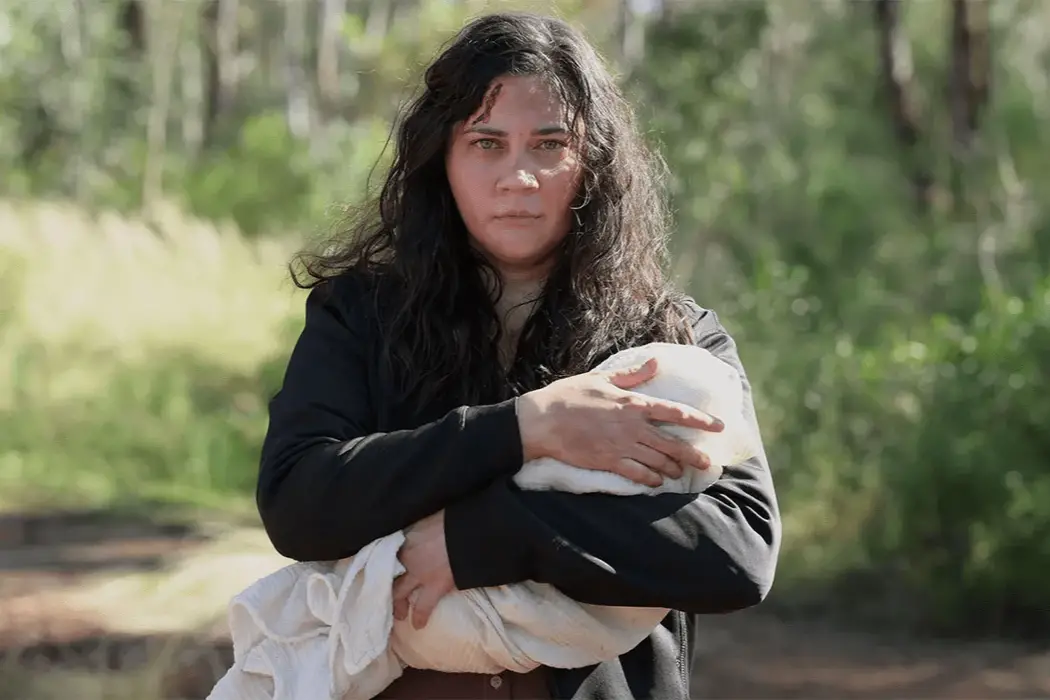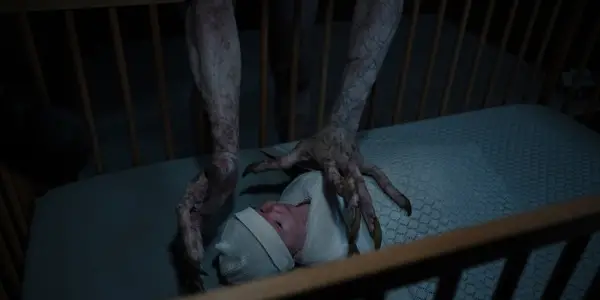Sundance Film Festival 2024: THE MOOGAI

Jules Caldeira is an Associate Editor for Film Inquiry based…
A parent’s fear of losing their child has permeated all of history. Such fear, at times rooted in history such as the forced assimilation of First Nations children around the world, can manifest in tales of creatures that come to steal your young ones in the night. With The Moogai, writer-director Jon Bell’s feature-length expansion of his 2020 short film, he weaves historical trauma and a new mother’s struggles to deliver a thematically rich supernatural horror that will resonate with audience across cultural borders, and particularly with women who feel unheard or unseen in their battles with postpartum depression and other afflictions.
The Supernatural Meets the Psychological
The film opens in the tranquil bushland of Australia, as two Indigenous sisters play among other children. Two white men approach, and the children are sent into hiding by the woman watching over them. They attempt to take a boy as the others scatter. One of the sisters hides in a cave, but quickly discovers it’s occupied by the Moogai — a Bundjalung term for boogeyman. As her sister attempts to rescue her, she’s clawed in the face and is helpless as she watches her sibling be dragged into the darkness.

Fifty years later, Sarah (Shari Sebbens) gives birth to her second child, nearly dying on the table, and her husband Fergus (Meyne Wyatt) is instructed by their doctor (Toby Leonard Moore) t0 ensure she gets as much rest as possible. This becomes difficult as Sarah begins having visions, in both sleeping and while awake, and her eldest child Chloe (Jahdeana Mary) has befriended an unseen entity. As Sarah starts to see a little girl repeatedly warning her “He’s coming…” her biological mother Ruth (Tessa Rose), whose face is scarred from the incident with her sister, attempts to help and give warning. Sarah refuses, angrily denouncing Ruth as her “real mother,” indicating she herself has been adopted by white people. As her visions become more vivid and real, Fergus becomes concerned as the lines between exhaustion and haunting are blurred, leading to shocking instances of danger for Sarah and her family.
Exceptional Acting, Apt Allegories
From the outset, Sebbens carries this film. Her performance is unmatched, and the complexity of her character’s upbringing lends itself to the metaphors put forth in Bell’s script. Wyatt does quite well as the father out to protect his kids at all costs, from anyone, and Tessa Rose enters every scene with the unmistakable air of someone who’s seen some shit. With the powerful performances of these two women, the film balances eerie suspense with false starts and jump scares to keep you uncomfortable for much of its tight runtime, with a climax that brings all its themes full-circle.
In his feature directorial debut, Jon Bell has created a fantastically gripping supernatural horror, which not only stands on its own but is further enriched in Indigenous lore and the tragic history of First Nations children removed from their homes. Though the scares could have hit a bit harder in places, the themes of historical tragedy and psychology penetrate The Moogai so deeply that the emotional resonance stands strong.
Does content like this matter to you?
Become a Member and support film journalism. Unlock access to all of Film Inquiry`s great articles. Join a community of like-minded readers who are passionate about cinema - get access to our private members Network, give back to independent filmmakers, and more.
Jules Caldeira is an Associate Editor for Film Inquiry based in Sacramento, CA. He's a drummer, part-time screenwriter, and full-time Disney history nerd who can be found on social media when he remembers to post, and can be contacted at [email protected].













